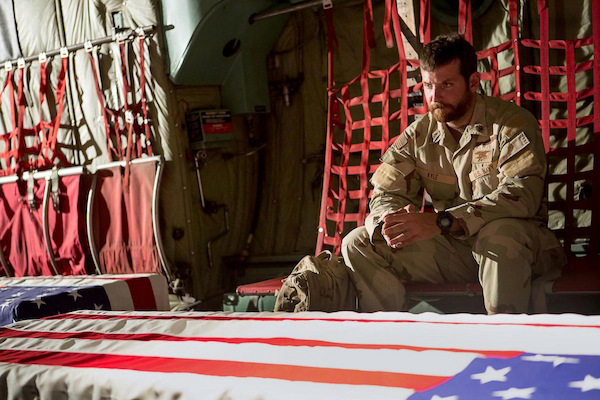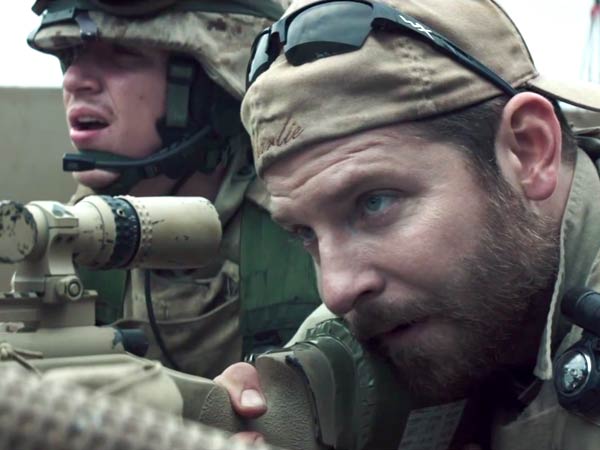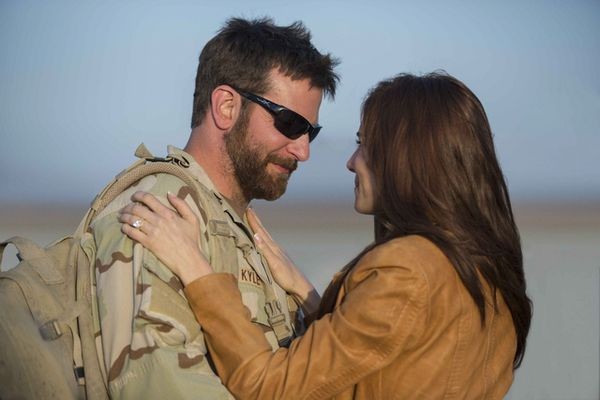American Sniper Review
Stories of American soldiers — their bravery in the field, their struggles to return to civilian life — have been well documented by Hollywood. The first thing to think about, therefore, is what makes each a necessary or unique story to tell. “American Sniper” tells of the life and years of service of Chris Kyle, a Navy SEAL sniper who killed more enemies than any soldier in U.S. military history during his four tours in Iraq.
Kyle (Bradley Cooper) was a Texas cowboy who at the age of 25 felt he could be of value serving his country and became a Navy SEAL. While in Iraq, Kyle was primarily tasked with protecting ground units from threats they couldn’t see, meaning many of the people he killed were in a position to take the lives of American soldiers. Before he finally finished serving, his reputation as a legend proceeded him.
That, in essence, is what makes “American Sniper” different from other 21st century war films. The other elements of his story make him just another soldier: a man who was willing to put his life on the line for his country, left his wife (Sienna Miller) and two kids for months on end to do it and wrestled with the side effects of post-traumatic stress disorder when he was home and after he quit. The film soundly and movingly depicts the life of this consummate soldier, but it glosses over the story’s defining characteristic — that its main character is both a beloved hero and an elite killer.
As a blue-blooded patriot, Clint Eastwood is both the perfect and maybe even the wrong choice for this film. Eastwood certainly shows us why he’s been a good director for so long, in some ways reminding us after his recent string of critical duds. Yet he (and admittedly screenwriter Jason Hall, who adapted Kyle’s memoir) evades a certain level of depth when it comes to the themes and issues this story presents. The film doesn’t ignore PTSD and the hurtful effects that military life can have on a family, nor does it silence the point of view that war, specifically Operation Iraqi Freedom, is inherently controversial, but it does limit their influence on the film’s message.
Hall’s screenplay walks the line when it comes to opinions on war. Put a Southern, conservative, God-fearing patriot in the same theater as an urban, liberal, agnostic and one might tell you “American Sniper” is an amazing, truly American film that honors those who rid the world of evil to keep America safe, while the other might say it casts an uncomfortable shadow of doubt over war as it relates to American values. A third person might even tell you it’s nothing short of propaganda.
Although it doesn’t pick sides on war, “American Sniper” does choose to portray Chris Kyle as a hero, and therein lies the controversy. Not that Kyle wasn’t a brave and good person, but that he’s a hero for his actions. On one hand, while working closely with Kyle, his friends and family, filmmakers do not want to create something that would in any way be disrespectful to them. On the other, certain aspects of his story are conspicuously under-developed, with the emphasis on the action and suspense of the military action he saw.
To avoid delving too far into it, I’ll simply say that never before has a movie’s ending credits sequence informed its message to the extent that “American Sniper’s” does. It honestly complicates the movie, what the takeaways are supposed to be, and highlights a lot of the gaps in the storytelling, primarily how what we see in the Iraq scenes translates into the “legend” of Chris Kyle at home. The script merely hopes that lots of characters telling Kyle how they’ve heard this and that about him will convey the truth of it to the audience. Nothing that we see truly confirms how incredible of a soldier Kyle was.

To go back to the surface layers, “American Sniper” holds interest and suspense extremely well. Eastwood’s technique doesn’t compare with the way Kathryn Bigelow powerfully portrayed soldiers in the Middle East in “The Hurt Locker” and “Zero Dark Thirty,” but the level of intensity in both the action sequences and in the way Kyle struggles at home exhibit excellent craftsmanship. And neither is it dumbed down — Hall creates some sharp dialogue and plenty of humanizing, touching moments.
Cooper is probably the best thing about the movie. Sporting a legit Texas accent and bulking up to look almost exactly like Kyle, he definitely shows his versatility. Most of his previous roles have showcased charm or paranoia; here he plays a realistic, humble action hero of sorts. In the non-action scenes, he colors the Texan stereotypes with a complex psychological portrait.
“American Sniper” captures the essence of the contemporary war story in a way that allows contrary opinions to coexist, but it doesn’t answer the question, “why Chris Kyle?” His story is compelling, probably more compelling than most, but “American Sniper” doesn’t feel like the story of “the deadliest sniper in U.S. history” so much as the story of “a dedicated, courageous soldier who happens to be the deadliest sniper in U.S. history.”
3.5/5 Stars
American Sniper
Directed by Clint Eastwood
Written by Jason Hall; Chris Kyle, Scott McEwen, James DeFelice (book)
Starring: Bradley Cooper, Sienna Miller, Kyle Gallner






0 Comments
You can be the first one to leave a comment.